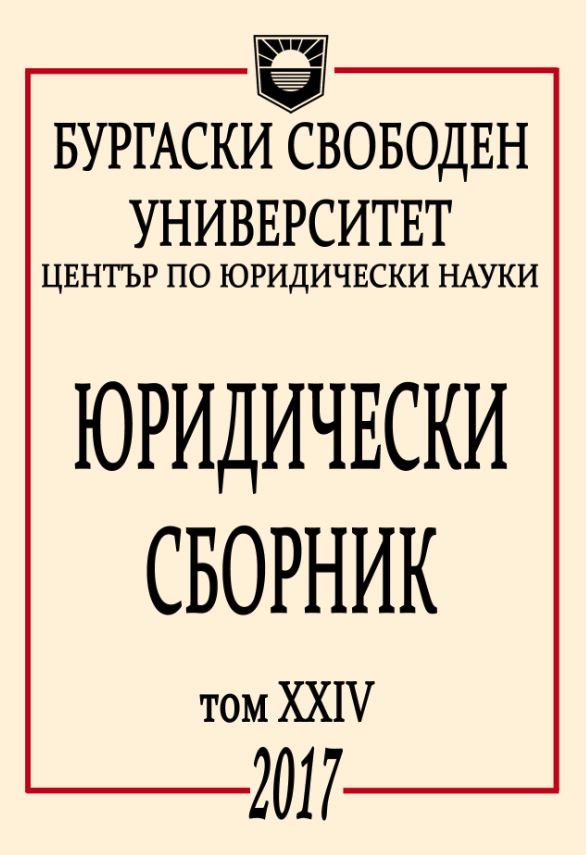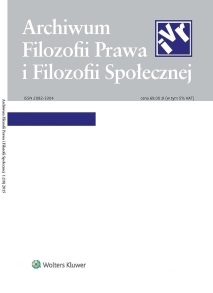
ТАКТИЧЕСКИ ОСОБЕНОСТИ НА РАЗПИТА ПРИ РАЗСЛЕДВАНЕ НА ТЕРОРИСТИЧНИ АКТОВЕ С ВЗРИВНИ УСТРОЙСТВА
This article presents the tactical features of investigating witnesses and indictees in investigating terrorist acts with explosive devices.
More...We kindly inform you that, as long as the subject affiliation of our 300.000+ articles is in progress, you might get unsufficient or no results on your third level or second level search. In this case, please broaden your search criteria.

This article presents the tactical features of investigating witnesses and indictees in investigating terrorist acts with explosive devices.
More...
The report reviews the importance of the presence of security and defence institutions across social media. The paper highlights the challenges before some of them in pursuing this objective. It accentuates on social media opportunity available to the army – to communicate more successfully to target audiences. Threats due to inexpert posting have not been skipped either. The paper contains many examples in illustration of the activity of various armed forces across social media.
More...
In this article, some questions issues related to the Electronic Register of Projects and Activities under the E-Government Law. It briefly describes what it represents and from whom it is led, focusing on the issues related to its scope and the obligated subjects on it. The author believes that clarifying them is crucial to the applicability of the registry and its future use.
More...
The aim of the author is to reveal how the changes in the modern society reflect over classic institutes and guarantees, developed in criminal law through centuries. The new challenges demand a new approach – especially towards the terrorism and organized crimes. Regretfully many of these new measures strongly affect the human rights and even the established law standards and thus ruin the very basement of rules of law state. The goal in the legislative and legal science should be to find a balance between security and freedom.
More...
Security threats recently emerging to Russia's demanded new approaches and methods to resist them. It leads to revising of regulatory support in sphere of Russia's national security by adopting a package of conceptual and doctrinal documents. The article analyzes the legal foundations of strategic planning in Russia's national security in the light of the adoption of the Federal Law „About Security”, National Security Strategy of the Russian Federation until 2020, the concept of public security in the Russian Federation and other legal acts. It was revealed that during the lawmaking many defects of existing legal framework in the area of national security were made, which is impossible to correct in the process of enforcement.
More...
The article discusses the challenges that the countries are facing in their antiterrorist battle. The main thesis of the author is that the measures to protect the human rights should not contradict the antiterrorist strategies. A balance should be established between the two. The thesis has at its core the analysis of two of the judgements of the Grand Chamber of the European Court of Human Rights in 2016 - Armani Da Silva v. United Kingdom and Ibrahim and Others v. United Kingdom.
More...
This report for the first time reviews Alternative Dispute Resolution (ADR) and in particular, using mediation techniques as part of political mediation for the purpose of mitigating crises and conflicts before and during political elections. The authors argue that political mediation is an effective instrument in the election processes due to its capacity to prevent conflicts. At the same time they point that mediation techniques should be congruent with the national mindset (culture) or, otherwsie, they would not serve their purpose.
More...
Kozloduy NPP is the only organization in the Republic of Bulgaria that operates a nuclear facility in conditions of high technology, efficiency and competitive prices in the production of electricity. As a subject of critical infrastructure in the Energy sector, the NPP is classified as a object of strategic importance for National Security.
More...
This article is dedicated to legal personality in financial law as it does not claim comprehensiveness. Reviewed are the main issues related to legal personality of various subjects in the financial law. Made is a brief comparative analysis with the Russian legal system.
More...
This article focuses on an analyze of the legal framework regarding the obligation of the individual employer and employers' organization to negotiate the conclusion of a collective agreement at the level of enterprise, branch, sector, municipality. Often the understanding is supported that the negotiation process is not up to the free will of the employer, as such a legislative approach is chosen not by accident; it actually aims at providing protection for an important interest. Further attention is paid to the matter of the compensation owed by the employer for breach of the obligation to enter into negotiations for conclusion of a collective agreement.
More...
The rulings are the most frequent acts pronounced by the court within the frames of a court proceeding on civil cases. In spite of this, the legislation in force as well the legislation in historical view does not give definition of this term.In the article, the author works out the characteristics of the ruling as an act of the court and suggests a definition of the term. The article includes the attempt of the author to explain the similarities and the differences of the court ruling to the other acts, issued by the court – the order and the court decision.
More...
The reverse writ of execution is an official document envisaged by the Code of Civil Procedure as а title for protection of the debtor against substantive illegality of the enforcement proceedings. By the issuance of the reverse writ of execution the debtor receives the right to claim back all property and/or sums collected in the course of enforcement proceedings, whose legal groundbasis have been revoked by a final court decision. In the article, The author analyzes the concept of the reverse writ of execution, the prerequisites and the procedure for its issuance, as well as the controversies around that legal instrument. Particular attention is paid to the scope of the reverse writ of execution and to its comparison to other claims. Comparison to similar hypotheses is made.
More...
The Article concerns pre-sentence report. It reveals its’ purposes to provide the sentencing court with succinct and precise information upon which to base a rational sentencing decision. The author analyses the up to date legislation and makes conclusions for legal amendments.
More...
Central among the many obscurities that attend the rule of law are those named in the title of the article. The first part contains some preliminary remarks and attempt to answer the first question. This attempt is based on distinguishing two ways of understanding what rule of law is. By the first way rule of law is a theological concept, i.e. to know what it is we have to know its aims and by the second, anatomical one, the most important thing to understand it are rules and institutions that are usually conceived as its part. The author holds a position that only the first way is appropriate and gives his own interpretation of aims of rule of law. This aim is legal reduction of the possibility of arbitrary exercise of power that is connected with four important reductions – of domination, of fear, of indignity, and of confusion.
More...
The law as a border concerns both acts of man and the power and a territory of a state. The law as a border is a social institution more sophisticated than it seems to be in traditional concept of legal positivism and Austin’s point of view. In the state law there are many borders (in criminal law, civil law, administrative law, procedural law relating to terms, freedoms and rights, obligations, going to court, and on the other hand, competences/authorities of public offices etc.). In a narrow sense the law as a border is the state law, which establishes borders of human act and behavior through the sphere of legally allowed, forbidden and ordered acts creating institutionalized legal sanctions for the break of the border and non-respect for legal norms. In a wide sense the law as a border is also mine – „my” law, “internal” law (Petrazycki’s psychological theory of law), making one’s the rules of behavior and relating to the state law (the law as a border in a narrow sense) in many ways. Customary law (also religious law) and international law are very specific branches of the law. I maintain that the law as a border must be supported by other normative systems such as morality, religion etc.
More...
What is usually acknowledged as a topicality indication of Gustav Radbruch’s legal philosophy is the theoretical interest in and practical application of his ideas – known as the Radbruch’s formula – on abominable law, statutory non-law and the refusal to apply it by public authorities, the judiciary in particular. The article main argument is that we can point to other than Radbruch’s formula elements in his philosophy of law which are still applicable and present in the recent discussion on the concept of law itself, its validity and application. What this means is basic to Radbruch’s thought the distinction between the concept of law (Rechtsbegriff), the idea of law (Rechtsidee) and the relationship between the two. The solution accepted by Radbruch in this matter is very broadly applied by the representatives of the nonpositivist concept of law. However, the solution may be ascribed a more general meaning, which manifests itself in the ‘claim to correctness problem’ (Anspruch auf Richtigkeit). Such a claim has to be an element not only of law itself but also of all legal statements including acts of applying the law. The point I endeavour to defend is that out of the three interpretations of the claim to correctness problem, the one which refers not only to the correctness of legal order and law application acts, but also to lawyers’ professional obligations and responsibility is the best justified. This is because such a view most fully addresses the challenges of modern law, which has become increasingly professional in character, but on the other hand more prone to factors typical to fully professionalised walks of life – to critical factors especially. The question of how much the interpretation is compatible with Radbruch’s perspective, is beyond the scope of this analysis. However, some arguments suggesting higher degree of concordance will be presented.
More...


In this chapter, our intention is to summarize the structure of the work of lawyer Mr Novović. The work '' INDIVIDUAL REQUIREMENTS FOR THE COMPENSATION OF HARMONY IN HUMANITARIAN LAW '', in addition to the foreword to the reviews, contains the following topics:1) Introduction to the problem of humanitarian law;2) Court dispute over the bombing of the bridge in Varvarin;3) The position of the problem within the framework of humanitarian law - the consideration of issues related to the violation of humanitarian rights, which are relevant for the achievement of civilian compensation;4) Violation of the individual primary right of victims;5) Individual protection securitization law - securitization requirements. (in this chapter, the author has dealt with over 20 problems of humanitarian law after the Second World War to date);6) Law and protection law (this issue is widely addressed within the National Courts, Great Britain, Italy, Germany, Greece, Japan, America, and other countries);7) Forced laborers in Germany (deutsche, zwangs arbaiten);8) Ex gratia and solatio-compression (this issue is discussed by the author as a paradigm in the Netherlands and Israel, and analyzes the Hague Agreement, as well as the protocol of the Geneva Convention);9) Solidarity - Allegiance to the Allies;10) The author gives a special concluding remark, with annexes of the list of used literature.
More...